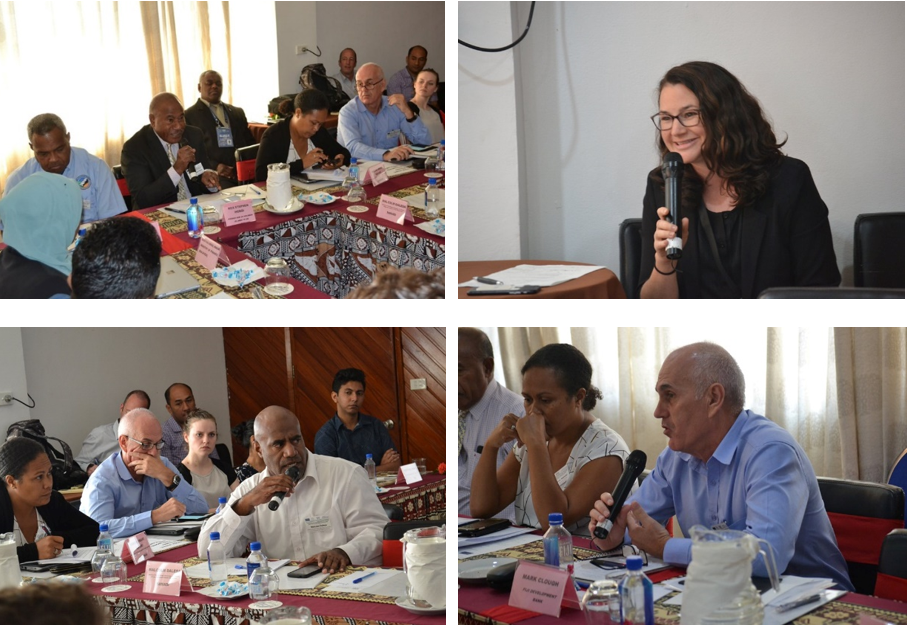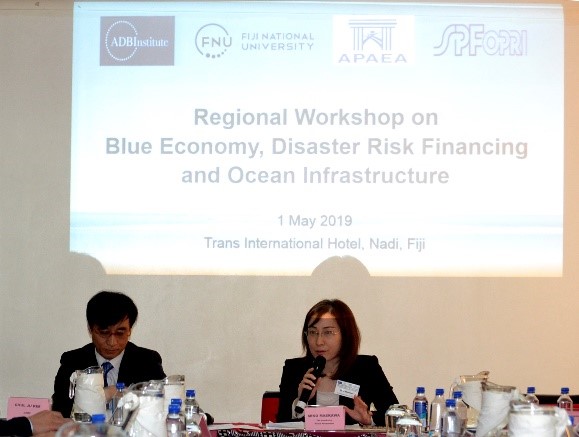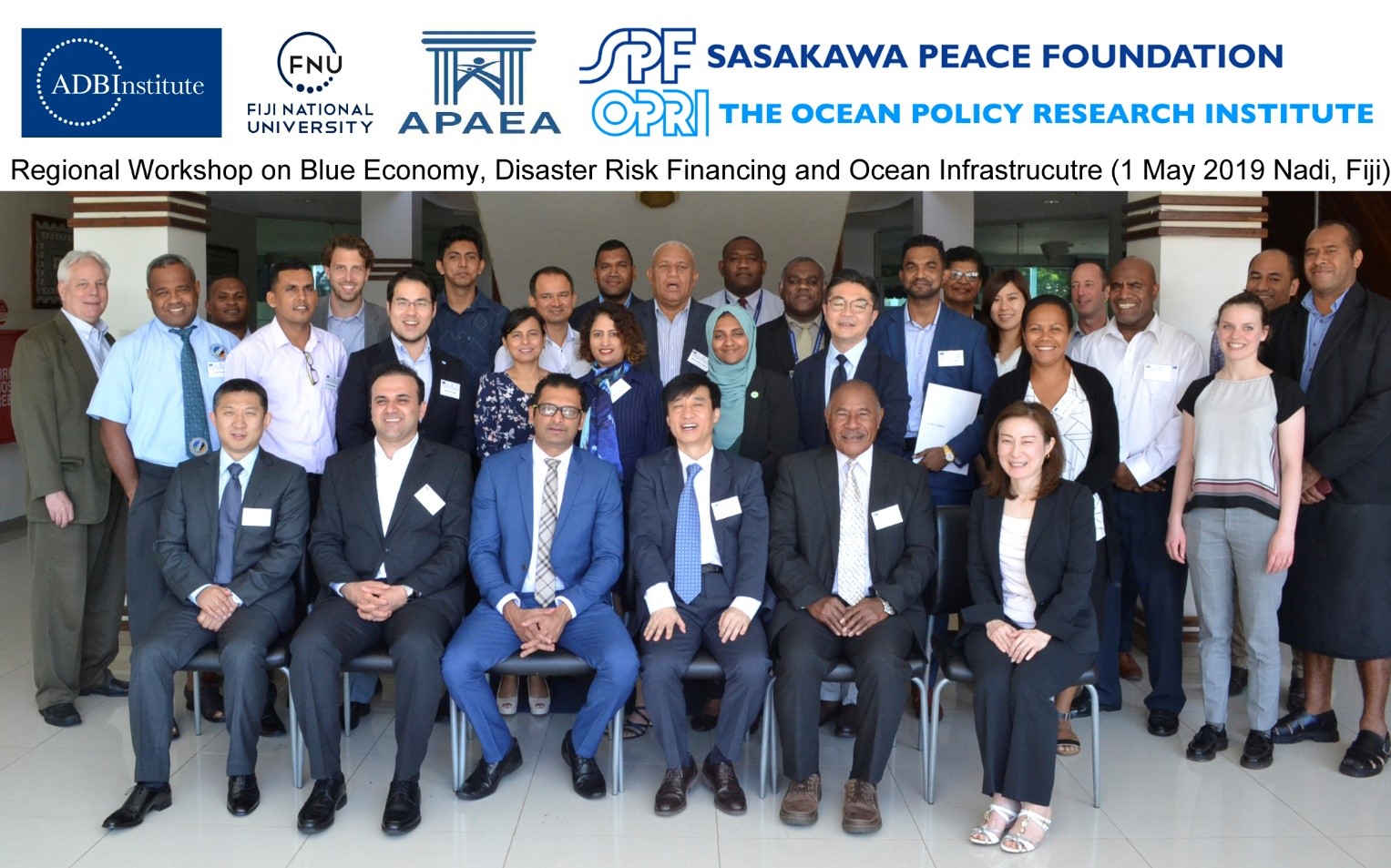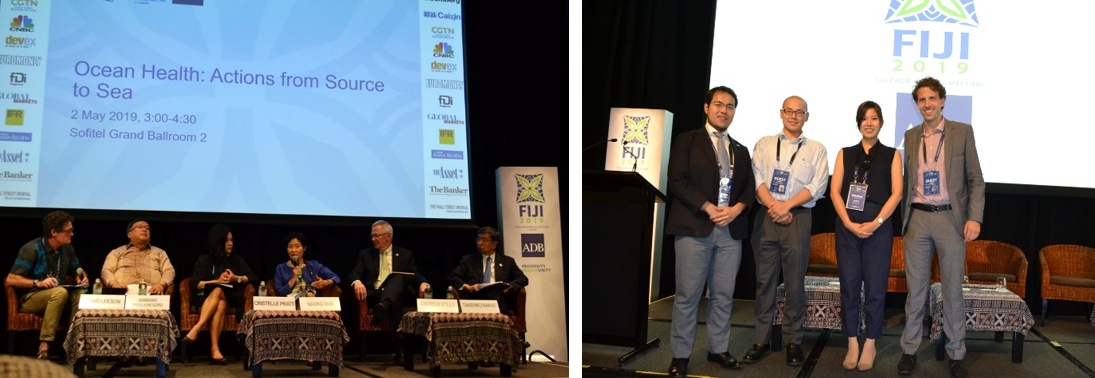News
News
[Event Report] Side Event at the 52nd ADB Annual Meeting: Regional Workshop on Blue Economy, Disaster Risk Financing, and Ocean Infrastructure
2019.06.03
On the first day of the Reiwa Era, May 1st 2019, the Ocean Policy Research Institute (OPRI) of the Sasakawa Peace Foundation co-organized a Regional Workshop just prior to the ADB Annual Meeting held in Nadi, Fiji. The theme of the workshop was the Blue Economy, Disaster Risk Financing, and Ocean Infrastructure and it was co-organized with the Asian Development Bank Institute (ADBI), Fiji National University, and the Asia-Pacific Applied Economics Association (APAEA). Focusing on sustainable ocean management and blue financing, 20 speakers from academia and funding institutes made presentations at the workshop with 70 participants, consisting of specialists and government officials from Pacific states.

Opening remarks by OPRI President Atsushi Sunami (left) and ADBI Deputy Dean Chul-Ju Kim (right)
In his opening remarks, OPRI President Atsushi Sunami pointed out that the theme of the workshop – the “beautiful harmony” of humanity, ocean, and disaster risk management was an apt reflection of the meaning of the new “Reiwa” era of Japan. In addition, he noted that further development of the blue economy requires more innovative financing activity, thus emphasizing the significance of “blue finance.” In his keynote speech, ADBI Dean Naoyuki Yoshino spoke on the importance of private investment for ocean infrastructure, especially the energy sector. He suggested that such infrastructure investments could create a ripple effect on government revenue and also a positive cycle of better rates of return on investment.

ADBI Dean Naoyuki Yoshino introduced the importance of ocean infrastructure (left) and OPRI Researcher Nagisa Yoshioka demonstrated the potential of blue finance.
The three sessions of the workshop were the “Blue Economy, Ocean Infrastructure and its Impact,” “Implications of Disaster Risk Management for Blue Economy,” and “Regional Focus – Small Island Developing States,” with presentations by specialists followed by discussions. Professor Joeli Veitayaki from the University of the South Pacific indicated the importance of fund accessibility for coastal communities from the viewpoint of climate change adaptation and ocean conservation. Moreover, other specialists suggested the application of innovative financing mechanisms through insurance for coral reef preservation.

Lively discussion among the participants.
Mr. Nepomuk Dunz from the International Institute for Applied Systems Analysis (Austria) also demonstrated a disaster recovery model – BinD, newly developed for island countries. OPRI researchers – Mr. Hajime Tanaka, Ms. Nagisa Yoshioka and Dr. Michael C. Huang also presented the results of their research, a case study in Fiji using economic analysis on disaster risk concerning tourism. In addition, the Seychelles blue bond issued in October 2018 was introduced as a new instrument for financing. These may provide ideas to countries with an abundance of tourism resources such as Fiji. Blue financing methods are expected to utilize ocean resources and activate domestic financial markets to support sustainable development of ocean eco-system based tourism. In the concluding remarks, ADBI Deputy Dean Chul-Ju Kim and OPRI Senior Research Fellow Miko Maekawa summarized the issues discussed in the workshop and expressed the urgent need for future opportunities for academic collaboration.

Closing remarks and future perspectives made by OPRI Senior Research Fellow - Dr. Miko Maekawa

Group picture of the workshop
Japanese Finance Minister Taro Aso and other political leaders also attended the ADB Annual Meeting, where the announcement of the “Ocean Financing Initiative” was made to advocate the investment of $5 billion in an “Action Plan for Healthy Oceans and Sustainable Blue Economies,” highlighting the massive and problematic issues of ocean pollution. It is indispensable to consolidate economic growth in the fishery and tourism industries that small island developing states (SIDS) depend on, using diversified and sustainable financing methods, and to tackle problems such as climate change and natural disaster risk while increasing regional resilience. The workshop provided the occasion for academia and practitioners to share and accumulate knowledge. It is hoped that productive discussions and academic collaboration on these challenges will continue to be carried out among the participants in future.

Young researchers participated in several sessions in the 52nd ADB Annual Meeting
(Nagisa Yoshioka, OPRI Research Associate)